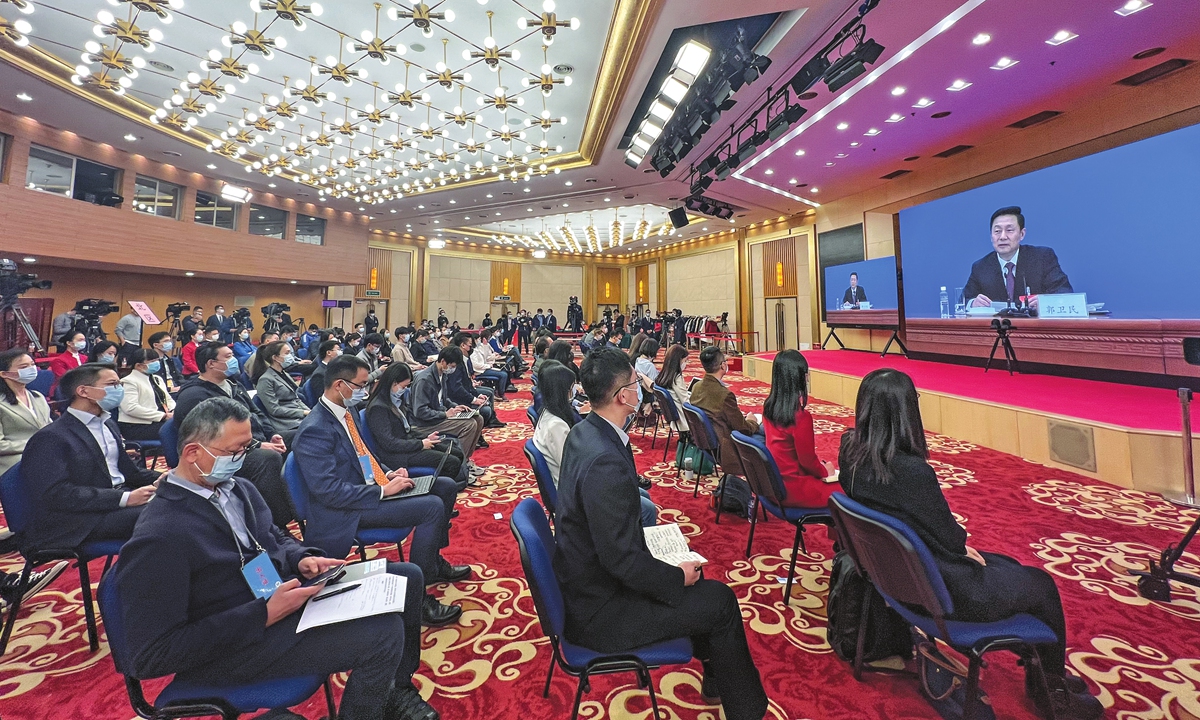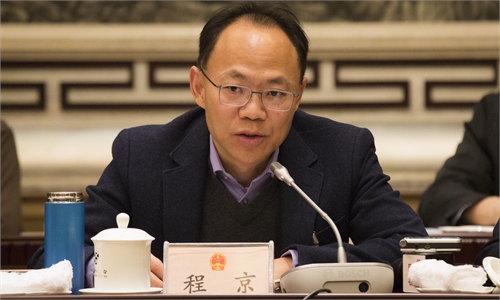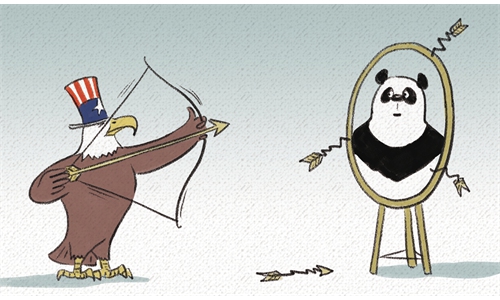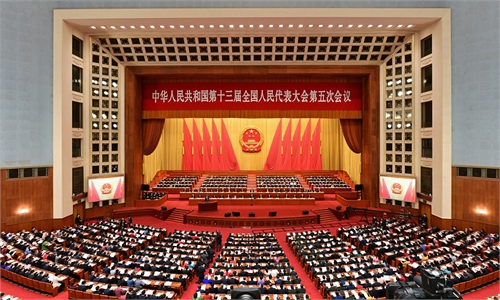
Journalists attend a press conference of the fifth session of the 13th National Committee of the Chinese People's Political Consultative Conference (CPPCC) via video link in Beijing, capital of China, on March 3, 2022. Photo: People's Daily
Editor's Note:
"The democratic system of China is good and has energy," which is reflected in the fact that China is full of vitality and is among the top powers in the world, said Giancarlo Elia Valori, an Italian economist. Despite various interpretations and slanders against Chinese-style democracy, Valori gave fair credit to China's efforts in advancing its own democratic construction. How to understand Chinese democracy? Why are Chinese people more confident about their own democracy? Valori shared views with Global Times reporter Yu Jincui via email.
GT: Chinese democracy is a whole-process people's democracy and the two sessions are a vivid example of how the whole process of people's democracy works. How do you understand whole-process people's democracy?
Valori: Democracy in China is deeply rooted in the Chinese land, and hence it has its own vitality. Specifically, Chinese democracy has the following characteristics:
First, broadness and authenticity. Democracy in China is linked to the socialist path chosen by the Chinese people and not by others for them. The establishment of the socialist system in China has freed the great masses of people from their status of oppression and slavery to imperialism and the exploiters of the so-called "free world". The Chinese people have truly become the masters of themselves and of their country and society. The socialist system has created the conditions for achieving true social equality and made it possible for large masses of people to enjoy an equitable economic society not only in law but also in fact.
The equality of economic and social rights has laid realistic foundations for the policy of Chinese democracy, which can prevent and remove the political inequality caused by economic inequality, thus preventing and avoiding the control of social and political power by business, money and parties which have traditionally represented the interests of the wealthy classes and not the country.
Second, participation. The foothold and goal of China's democratic system and democratic practice is to orient, guide and ensure that the largest masses of people participate in the management of the country's economic, cultural and social affairs at all levels. Democracy is not only manifested in the fact that people entrust representatives with the government but, more importantly, in the fact that it gives the right of participating in the direct management of the State and social affairs.
Third, progressive goals. The construction of democracy cannot go beyond the stage of social development without considering harmful consequences such as environmental deterioration. Both history and the facts that have not yet become history tell us that every democracy is built on certain social, economic and cultural foundations and must go through a process of gradual development and completion. The People's Republic of China firmly and proactively promotes the construction of democracy but pays great attention to acting in accordance with the social development laws, so that political democracy can be adapted to China's current conditions, level of economic development, as well as cultural and educational level - i.e. it must not be turned into an instrument of prevarication and abuse of power by a wealthy class over the people.
Today's China is full of vitality and is among the top powers in the world. This shows that the democratic system is good and has energy. It is obviously undeniable that the Socialist democratic political construction is still in its development stage, and there are still many imperfections and shortcomings. These still need to be continuously explored in future practice, as well as gradually overcome and improved. It is therefore absolutely ridiculous, on the one hand, and in bad faith, on the other, to wish a Western democratic system for the People's Republic of China. It would mean dividing and destroying the national unity and making China become again the trough of the countries regarded as the "fathers of democracy".
GT: Many Chinese people's views on democracy have changed in the past decade. They have become more confident and critical of Western views of democracy. Why is the Western narrative of "democracy and freedom" no longer fooling the young Chinese generation?
Valori: The Chinese - especially the young people, have recently been asking themselves some questions that foreshadow the failure of propaganda and of the so-called "soft power" projected by the US onto the world, which now deceives very few people.
In China, it is well known that democracy is a right of the people in all countries, not the patent of some individual states. It is therefore absurd for a country to declare to have the monopoly of the definition and model of "democracy".
As the world's first superpower, the US implemented a modern democratic system early in history, and its people also fought for their democratic rights for a long time. In recent years, however, US democracy has gradually turned into an instrument for a few people to seek personal gains and violate the human rights that cause social disintegration.
Democracy as a fetish has now become a pretext and an excuse for the US to maintain its hegemony, interfere in the other countries' internal affairs and undermine the international order.
GT: China insists that countries with different political systems can coexist, and it emphasizes win-win results in the development process. However, the US and some Western countries want to divide the world into democracy vs autocracy. What risks and consequences will this bring to the world?
Valori: The US government ignores the huge differences in the level of economic development, history, and culture of different countries and regions of the world. It imposes its own political system and values on others and promotes "democratic transformation". It plans "colored revolutions" and arbitrarily interferes in other countries' internal affairs. It even subverts other States' regimes and then tries to unite them - through NATO - against those non-democratic countries that - in reality - control their own territories that we know today are the containers of 75% of the remaining energy resources of the planet, which the West covets.
The behavior of the US and its allies to shape other countries in their own image and drag them into war to "export democracy" in "non-democratic" state organizations is not democratic per se and basically violates the fundamental values of democracy. The places where the wars of the White House & allies have been waged have not only failed to produce a "democratic chemical reaction", but have instead plunged many regions and countries of the world into the quagmire of unrest, conflict, bloodshed and war.
Since the end of the 19th century the US has been systematically engaged in aggressively interfering in other countries' internal affairs, together with allies, under the banner of the so-called "democratic values", even instigating regime change and supporting revolts against democratically elected governments.
The US and Western allies have historically promoted the "New Monroe Doctrine" in Latin America in the name of "democracy promotion." They incited "color revolutions" in Eurasia, and remotely controlled the "Arab Spring" in West Asian and North African countries, thus bringing chaos and disasters in many countries, as well as severe damage to peace, stability and development in the world.
The young and old Chinese look around and see that in the countries where values are forcibly "sold" by the US and its allies, there is no trace of true democracy, freedom and human rights, but persistent chaos, stagnation, humanitarian catastrophes and deaths.
The export of US values to many countries has blocked their normal development process and prevented them from exploring development paths and models appropriate to their national conditions. It has caused severe political, economic and social turmoil in the territory and destroyed what were once the homelands of those peoples. It has fomented terrorism and other long-term consequences, as well as threatened and undermined regional and even global security. The "democracy" exported with bombs has been "a weapon of mass destruction" against dissident countries in the hands of the US and its Western allies.
I think this alone is enough for the young and old Chinese to stop trusting the postcards sold on Western newsstands.



